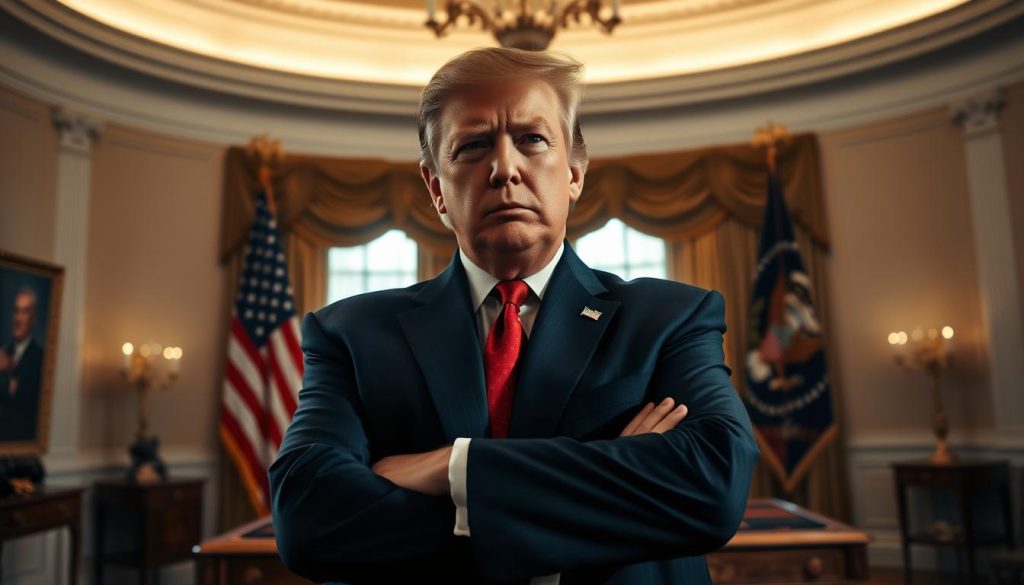President Donald Trump sparked controversy on Tuesday, June 24, 2025, when he used explicit language during official comments on the South Lawn of the White House. As he prepared to depart for a NATO summit in the Netherlands, Trump addressed reporters about the ongoing conflict between Israel and Iran.
After recent military actions, including the dropping of bunker-busters on Iran’s key nuclear sites, Trump expressed frustration with the two countries. “You know what? We basically have two countries that have been fighting so long and so hard that they don’t know what the f— they’re doing,” Trump told reporters.
This incident marks a significant moment in presidential communications, raising questions about the use of profanity in official capacity and its implications for diplomatic relations.
Key Takeaways
- President Donald Trump used explicit language during official comments about the Israel-Iran conflict.
- The incident occurred on the South Lawn of the White House as Trump prepared to depart for a NATO summit.
- Recent military actions between Israel and Iran had escalated tensions, prompting Trump’s strong reaction.
- The use of profanity by a sitting president in an official capacity has significant implications for diplomatic relations.
- This incident highlights changing standards in political discourse and presidential communications.
The South Lawn Incident: Trump’s Explosive Comments on Israel-Iran Conflict
A tense moment unfolded on the White House South Lawn as Trump made headlines with his unfiltered comments on the ongoing Israel-Iran conflict. The incident has raised questions about presidential protocol and the use of profanity in official settings.
What Trump Said and the Context Behind It
Trump’s comments were made in the context of a recent escalation between Israel and Iran. According to Russell Riley, co-chair of the Presidential Oral History Program at the University of Virginia’s Miller Center, “It’s a substantial violation of presidential protocol for him to use foul language under any circumstances, but particularly this word and this setting.” The remarks were captured by reporters, making them official utterances.
Immediate Reactions to the Presidential Profanity
The immediate reactions to Trump’s profane language were varied. White House staff, media outlets, and social media users all weighed in on the incident. Some key reactions include:
- Criticism from political analysts and presidential historians over the breach of protocol.
- Media outlets debating whether to censor or directly quote the explicit language.
- International reactions, particularly from Israeli Prime Minister Netanyahu and Iranian officials directly implicated in Trump’s comments.
The profanity potentially overshadowed substantive policy issues regarding the Middle East conflict in media coverage, as the world watched the unfolding drama.
Breaking Presidential Protocol: The Significance of Trump’s F-Bomb
The use of profanity by President Trump on the South Lawn has sparked a heated debate about presidential protocol. This incident has brought into focus the traditional norms of presidential communication and the extent to which they are expected to be followed.
Official Presidential Communication Standards
Official presidential communication is expected to adhere to certain standards of decorum and professionalism. The administration is typically cautious in its language to maintain a level of respect and gravity befitting the office of the president. These standards are not codified in law but are rather a set of unwritten rules that have evolved over time.
White House Response to the Incident
The White House press secretary defended the president’s language at a press briefing, stating that the American people appreciate the president’s willingness to speak his mind. This response indicates an attempt by the administration to contextualize the president’s language as authentic and relatable.
The Diplomatic Impact: How Trump’s F-Bomb Affected Middle East Relations
In the hours following Trump’s profane intervention, the world watched as the Middle East teetered on the brink of war. Trump’s comments on the Israel-Iran conflict were seen as a significant escalation, potentially undermining the fragile ceasefire.
Netanyahu’s Response to Trump’s Criticism
Netanyahu, who had been advocating for a strong stance against Iran’s nuclear capabilities for over 30 years, responded cautiously to Trump’s criticism. The Israeli Prime Minister had initiated strikes against Iran, labeling it a “blue and white” operation, though it was clear that US intelligence and weaponry played a crucial role.
- The operation highlighted the limitations of Israel’s arsenal, particularly when targeting nuclear sites.
- The US subsequently deployed B2 bombers to strike Iranian underground facilities, a move that underscored the necessity of US support.
Implications for the Israel-Iran Ceasefire
The ceasefire between Israel and Iran held precariously in the days following Trump’s comments, with both sides exercising restraint. However, the risk of war remained palpable, as the situation at the nuclear sites in Iran continued to be a point of contention.
Experts debated whether Trump’s unorthodox diplomatic approach had been effective, with some arguing it had enforced the ceasefire, while others saw it as a risky strategy that could have led to further escalation.
A History of Presidential Profanity: Trump’s F-Bomb in Context
Behind the dignified facade of the presidency, many U.S. leaders have been known to use profanity, often revealed through tapes, memoirs, or caught on a hot mic. This behavior is not new and has been a part of presidential history, with various leaders using strong language in different contexts.
Previous Trump Public Profanity Incidents
Donald Trump, the 45th President of the United States, has had his share of public profanity incidents. While not exhaustive, there have been notable instances where Trump’s language has sparked controversy.
- During a heated exchange, Trump used strong language, drawing both criticism and support.
- Such incidents have raised questions about presidential decorum and the use of profanity in public discourse.
Other Presidents and Their Colorful Language
Trump is not the only president to have used profanity. Several of his predecessors have been known to use strong language, often revealed through various means.
- Lyndon Johnson was famously crude during a meeting with the Greek ambassador in 1964, using profanity to express his frustration.
- Richard Nixon’s profanity was revealed through the Watergate tapes, showcasing a more candid side of the president.
- George W. Bush was caught on a hot mic calling a reporter a derogatory name during the 2000 election campaign.
- Joe Biden has also been caught using colorful language on multiple occasions, including during his presidency.
The use of profanity by presidents has been received differently across various eras of American history, with some instances sparking widespread controversy and others being relatively overlooked.
Changing Standards: What Trump’s F-Bomb Reveals About Modern Politics
Trump’s use of the F-bomb has sparked a debate about the evolving nature of political discourse. Experts suggest that Trump’s profanity reflects a “shifting change in public morality” and is part of his “blue-collar, locker room persona.” This authenticity is endearing to many voters, as it blurs the line between the public and private persona of the president.
The impact of social media and relaxed broadcast standards has contributed to a shift in what language is deemed acceptable in public discourse. Trump’s “authentic” communication style has influenced other politicians and campaigns, raising questions about whether this represents a permanent shift in presidential communication or a temporary deviation.
Generational differences in reactions to presidential profanity reveal changing social norms. As we move forward, it’s clear that the future of political discourse and diplomatic communications will be shaped by an increasingly informal media environment.
FAQ
What was the context behind President Trump’s explosive comments on the Israel-Iran conflict?
The incident occurred during a press conference on the White House lawn, where President Trump used profanity while discussing the conflict between Israel and Iran, specifically referencing a recent ceasefire agreement.
How did the White House respond to the incident involving President Trump’s use of an F-bomb?
The White House issued a statement attempting to downplay the incident, but the damage had already been done, with many world leaders and media outlets reacting strongly to the President’s language.
What are the implications of President Trump’s comments for the Israel-Iran ceasefire?
The ceasefire, which had been fragile at best, was put at risk by the President’s outburst, with some analysts suggesting that his words could escalate tensions between the two nations.
Has President Trump used profanity in public before?
Yes, this is not the first time President Trump has been accused of using profanity in public, with several previous incidents having sparked controversy during his campaign and presidency.
How does President Trump’s use of profanity compare to that of other U.S. Presidents?
While some Presidents have been known to use colorful language, President Trump’s willingness to do so in public and on the record is seen as unusual, reflecting a shift in the standards of presidential communication.
What does President Trump’s use of an F-bomb reveal about modern politics?
The incident highlights the increasingly informal tone of modern politics, as well as the blurred lines between formal presidential communication and more casual, off-the-cuff remarks.
How did Israeli Prime Minister Netanyahu respond to President Trump’s criticism?
Netanyahu’s office released a statement expressing disappointment with the President’s comments, but stopping short of direct criticism, reflecting the delicate diplomatic balance between the two nations.
What was the reaction of the international community to President Trump’s F-bomb?
The reaction was largely negative, with many world leaders and media outlets expressing concern and outrage at the President’s language, which was seen as unbecoming of a head of state.



